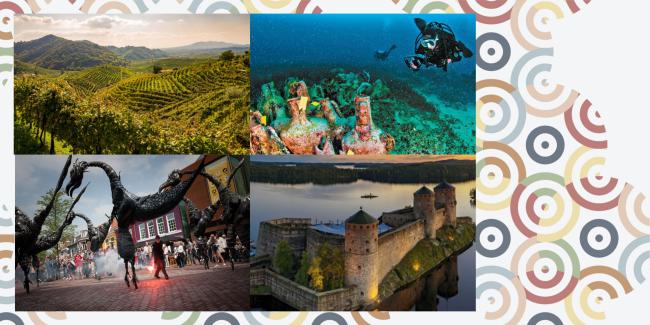
Be.CULTOUR Community explores the challenges and benefits of multilevel governance in cultural tourism
Be.CULTOUR community conversations are sharing and learning moments involving the entire project ecosystem, both the 6 pilot sites and 16 mirror regions for what is the true key moment defining the community building approach of the project.
Last month's event focused on multilevel approaches toward sustainable cultural tourism action plans and how to navigate and align the different levels.
The floor was given to four mirror region representatives, which presented their local strategies, approaches and plans to foster sustainable cultural tourism.
Giuliano Vantaggi, Site Manager, Associazione Colline Conegliano Valdobbiadene UNESCO Veneto Region, Italy, introduced the participants to the UNESCO heritage sites of Conegliano and Valdobbiadene, explaining the unique nature of the land and how these sites represent a remote tourism destination, right next to the often overcrowded Venice, which benefited from a targeted sustainable cultural tourism approach led by regional authorities. Find out more about this local case study here.
Jonathans Yannick, Senior Advisor Citymarketing, Events and Tourism Department of Economic Affairs, Municipality of Leeuwarden, The Netherlands, took participants to the European Capital of Culture 2018, UNESCO city of literature and apparently, the city where the happiest people in the Netherlands live: Leeuwarden, a fast-growing center which is benefitting from multilevel cooperation to innovation, combining creativity, economy and ecology, and placing culture at the center. Leeuwarden is hosting multiple cultural events at the municipal and regional levels which have been a huge success thanks to its approach involving both the government and the community, as well as private partnerships. Find out more about this local case study here.
Angeliki Veneti, Rural and Surveying Engineer MSc, Region of Thessaly, Greece, explained the steps that her region followed to plan for the construction of Underwater Museums and Diving Parks in the Sporades Islands and the Western Pagasitikos. Cradle of incredible history and heritage beauty, these sites have extreme socio-cultural importance for the region which had to be supported by significant changes in the legal framework of the country. The creation of underwater museums opened new perspectives, extending the tourist season and stimulating the local, real economy. Find out more about this local case study here.
Pellervo Kokkonen, Senior advisor – tourism and international cooperation Savonlinna Development Services Ltd, Finland, highlighted how valorization of cultural heritage assets in Savonlinna came from a combination of bottom-up and top-down strategies, ensuring dialogue with grass-root initiatives, participatory planning approaches and the development of policies at macro-level which foster project implementation in the local contexts. Find out more about this local case study here.
Inspired by the region's insights, participants further discussed important questions regarding the type of change needed to improve cooperation between multi-level actors as well as the challenges encountered when it comes to integrating such approaches in their local tourism action plans.
The sharing and learning together aspect is at the heart of Be.CULTOUR, which the regular community conversation brings alive. These sharing moments allow the community to learn from each other and develop connections among initiatives that will help them build the future of sustainable tourism in their local territories.
